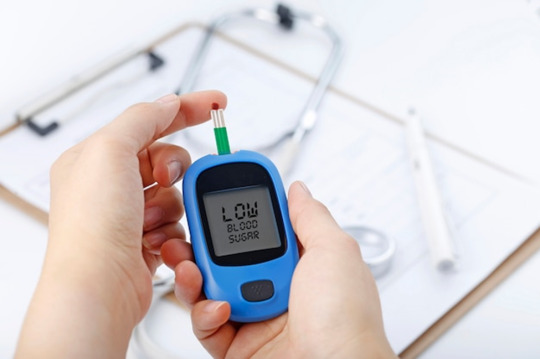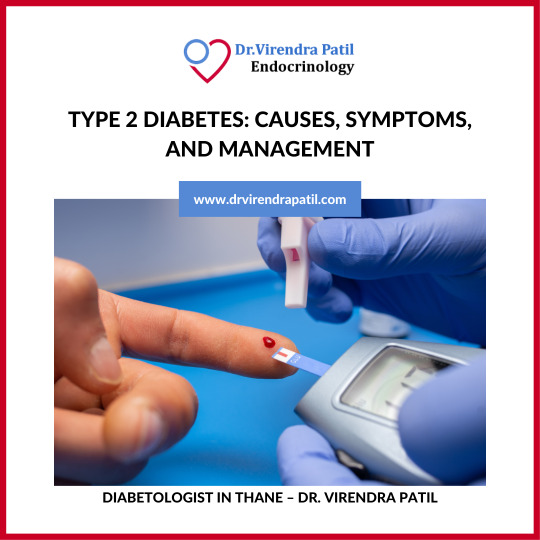Don't wanna be here? Send us removal request.
Text

Dr. Virendra Patil, a renowned Endocrinologist in Thane, excels in the effective management of endocrine disorders. Offering personalized care, he tailors treatment options to meet individual patient needs. With extensive experience and a commitment to excellence, Dr. Patil ensures the optimal well-being of his patients through meticulous attention to their endocrine health.
#endocrinologist#healthylifestyle#endocrinologistinthane#health#fitness#drvirendrapatil#endocrinology
0 notes
Text
Insights and Strategies for Managing Blood Sugar Levels
Active management is necessary for diabetics to maintain appropriate blood sugar levels and avoid problems. Understanding diabetes and implementing practical measures is essential to your general health and well-being, regardless of how long you've been managing the illness.
Types of Diabetes: Type 1 and type 2 are the two main forms of diabetes. An autoimmune disease known as type 1 diabetes is caused when the body's immune system unintentionally targets and kills the pancreatic cells that produce insulin. When the body either stops producing enough insulin to maintain normal blood sugar levels or becomes resistant to insulin, type 2 diabetes develops.
Monitoring Blood Sugar Levels: It's critical for people with diabetes to regularly monitor their blood sugar levels. A continuous glucose monitor (CGM), blood glucose meter, or other wearable technology can be used for this. Monitoring your blood sugar levels can help you better understand how certain foods, activities, and medications affect your body.
Healthy Eating: Diabetes management greatly benefits from a balanced diet. Make an effort to eat a range of foods high in nutrients, such as fruits, vegetables, whole grains, lean meats, and healthy fats. In addition to promoting general health, portion control and thoughtful eating can help regulate blood sugar levels.
Physical Activity: Maintaining a healthy weight is crucial for managing diabetes. Exercise contributes to blood sugar regulation, weight maintenance, and improved insulin sensitivity. Together with weight training activities, try to get in at least 150 minutes of moderate-intensity aerobic activity per week.
Medication and Insulin Therapy: In order to properly control their blood sugar levels, some diabetics may need to take insulin therapy or take oral drugs. Depending on your unique needs and medical history, your healthcare professional and you must collaborate closely to decide on the best course of action.
Stress Management and Sleep: Inadequate sleep and stress can have an impact on blood sugar regulation and general health. Use stress-relieving methods including yoga, meditation, deep breathing, and mindfulness. For the best blood sugar regulation, try to get between seven and nine hours of good sleep every night.
Through the integration of these techniques into your everyday regimen and close collaboration with your medical team, you can proficiently manage diabetes and sustain appropriate blood sugar levels for a happy and active existence. Recall that proactive management and consistency are essential for long-term success in the treatment of diabetes.
By incorporating these strategies into your daily routine and working closely with your healthcare team, including a Diabetologist in Thane, you can effectively navigate diabetes and maintain healthy blood sugar levels for a fulfilling and active life. Remember, consistency and proactive management, with the guidance of a Diabetologist in Thane, are key to long-term success in diabetes care.
0 notes
Text
The Role of Hormones: Exploring the Endocrine System
The Role of Hormones: Exploring the Endocrine System
Introduction The human body is a complex and intricate machine, with various systems working together to maintain balance and health. Among these systems, the endocrine system plays a crucial role by regulating numerous bodily functions through the release of hormones. Dr. Virendra Patil, a renowned Diabetologist and Endocrinologist in Thane, understands the significance of the endocrine system in maintaining overall well-being. In this article, we will explore the fascinating world of hormones and the pivotal role they play in our health.

Understanding the Endocrine System Before delving into the world of hormones, let's first grasp the fundamentals of the endocrine system. This intricate system consists of glands that secrete hormones directly into the bloodstream. These hormones then travel throughout the body to target organs and tissues, where they exert their effects. The major glands of the endocrine system include the pituitary gland, thyroid gland, adrenal glands, pancreas, and more.
The Power of Hormones Hormones act as messengers, transmitting vital instructions to various organs and tissues. They help regulate a multitude of functions, including:
Metabolism: The thyroid gland, for example, produces hormones that control metabolism, influencing how the body uses energy from food.
Growth and Development: Hormones like growth hormone (produced by the pituitary gland) play a pivotal role in growth during childhood and adolescence.
Stress Response: The adrenal glands release cortisol during stressful situations, helping the body respond to challenges.
Reproduction: Sex hormones, such as estrogen and testosterone, govern reproductive processes and sexual development.
Blood Sugar Control: The pancreas secretes insulin to regulate blood sugar levels, a key factor in diabetes management.
The Endocrine Orchestra Consider the endocrine system as an orchestra where the hormones are the notes and the various glands are the instruments. Our bodies work best when this symphony is perfectly balanced. However, imbalances can result in a number of health problems.
Common Endocrine Disorders Dr. Virendra Patil, with his expertise in Diabetology and Endocrinology, often encounters patients with endocrine disorders. Here are some common conditions:
Diabetes Mellitus: This well-known disorder occurs when the pancreas doesn't produce enough insulin (Type 1) or the body becomes resistant to insulin (Type 2), leading to high blood sugar levels.
Hypothyroidism: A sluggish thyroid gland can result in hypothyroidism, causing symptoms like fatigue, weight gain, and depression.
Hyperthyroidism: An overactive thyroid gland leads to hyperthyroidism, characterized by symptoms such as rapid heart rate, weight loss, and anxiety.
Adrenal Disorders: Conditions like Cushing's syndrome (excess cortisol) and Addison's disease (insufficient cortisol) affect the adrenal glands and can have various symptoms.
Polycystic Ovary Syndrome (PCOS): Common among women, PCOS is associated with hormonal imbalances, leading to irregular periods, weight gain, and fertility issues.
Hormonal Harmony and Health
Maintaining hormonal balance is essential for overall health and well-being. Dr. Virendra Patil, as a specialist in Diabetology and Endocrinology in Thane, emphasizes the importance of regular check-ups and early detection for hormone-related disorders.
Lifestyle and Hormonal Health
Several lifestyle factors can influence hormonal balance:
Diet: A balanced diet with adequate nutrients is crucial for hormone production and regulation.
Exercise: Regular physical activity can help improve insulin sensitivity and hormone balance.
Stress Management: Chronic stress can disrupt hormonal harmony, so stress reduction techniques are essential.
Adequate Sleep: Hormones that control hunger and metabolism might be impacted by inadequate sleep.
Conclusion The endocrine system and its hormones are the silent conductors of our health orchestra, orchestrating numerous bodily functions. The expertise of professionals like Dr. Virendra Patil, a Diabetologist and Endocrinologist in Thane, can help individuals maintain hormonal balance and address endocrine disorders effectively. By understanding the significance of hormones and their role in health, we can take proactive steps towards a healthier, more harmonious life.
#DiabetologistinThane#Endocrinologistinthane#diabetestreatmentinthane#diabetologist#diabetes#endocrinologist#health#healthylifestyle#type#wellness#fitness#bones#osteoarthritis#bonedensity#skinissues#osteoporosisawareness#osteoporosisprevention#hypothyroidism#nutrisitulang#obatpatahtulang#imbalance#vitamind#hormonal#drarpitgarg#kalsium#nyerisendi#arthritis#like#womenshealth#jointpain
1 note
·
View note
Text
Diabetes Complications: Long-Term Effects and Prevention Strategies By Dr. Virendra Patil, Well-knowned Diabetologist and Endocrinologist in Thane
Diabetes Complications: Long-Term Effects and Prevention Strategies
By Dr. Virendra Patil, Well-knowned Diabetologist and Endocrinologist in Thane
Diabetes has emerged as a global health concern, affecting millions of individuals worldwide. It's a chronic condition that requires careful management to prevent long-term complications. As a Diabetologist and Endocrinologist based in Thane, I believe it's crucial for patients to understand the potential long-term effects of diabetes and adopt effective prevention strategies to maintain their health and well-being.

Understanding Diabetes Complications:
Diabetes largely affects the body's capacity to appropriately regulate blood sugar levels. Uncontrolled diabetes can cause a variety of problems that damage numerous organs and systems over time. The following are the most prevalent diabetes complications:
Cardiovascular Complications: Individuals with diabetes are at a higher risk of developing heart disease, including coronary artery disease, heart attack, and stroke. Elevated blood sugar levels can damage blood vessels and lead to atherosclerosis, increasing the likelihood of cardiovascular events.
Neuropathy: Nerve damage caused by diabetes, known as neuropathy, can lead to pain, tingling, and loss of sensation, particularly in the feet and hands. This condition can result in wounds and infections going unnoticed, leading to serious complications.
Nephropathy: Diabetes is the major cause of kidney disease (nephropathy). High blood sugar levels can harm the filtration mechanism of the kidneys over time, leading in renal dysfunction and, in severe cases, kidney failure.
Retinopathy: Elevated blood sugar levels can damage the blood vessels in the eyes, leading to diabetic retinopathy. This condition can cause vision problems and, if left untreated, even blindness.
Foot Complications: Foot ulcers and infections can occur as a result of nerve loss and decreased blood supply to the feet. In severe circumstances, this may necessitate amputation.
Skin Complications: Diabetes can lead to skin issues, including dry skin, infections, and slow wound healing.
Prevention Strategies:
As a Diabetologist and Endocrinologist in Thane, I strongly emphasize the importance of managing diabetes effectively to prevent complications. Here are some strategies to consider:
Blood Sugar Control: Maintaining optimal blood sugar levels through a combination of medication, diet, and regular exercise is essential. Regular monitoring can help identify trends and enable timely adjustments.
Healthy Lifestyle: Adopt a balanced diet rich in whole grains, lean proteins, fruits, and vegetables. Regular physical activity, such as walking, swimming, or yoga, can aid in weight management and improve insulin sensitivity.
Adherence to Medication: Take prescription drugs exactly as advised by your healthcare practitioner. These drugs are critical in managing blood sugar levels and preventing problems.
Regular Check-ups: Schedule regular appointments with your Diabetologist or Endocrinologist in Thane. These visits allow for close monitoring of your diabetes management and early detection of any potential complications.
Foot Care: Proper foot care is essential. Inspect your feet daily for any cuts, sores, or infections. Wear comfortable shoes and avoid walking barefoot.
Blood Pressure and Cholesterol Control: Diabetes increases the risk of high blood pressure and high cholesterol. Managing these conditions can significantly reduce the risk of cardiovascular complications.
Eye Exams: Regular eye exams can detect and treat diabetic retinopathy early, preserving your vision.
Conclusion:
Diabetes complications can have a significant impact on an individual's quality of life. However, with proper management and the guidance of experienced professionals like myself, these complications can often be prevented or minimized. As a dedicated Diabetologist and Endocrinologist in Thane, I am committed to helping my patients understand the risks, adopt healthy lifestyles, and manage their diabetes effectively to lead long, fulfilling lives free from the burden of complications. Remember, early intervention and proactive care are key to preventing the long-term effects of diabetes.
#DiabetologistinThane#Endocrinologistinthane#diabetestreatmentinthane#diabetologist#diabetes#endocrinologist#health#healthylifestyle#type#wellness#fitness#bones#osteoarthritis#bonedensity#skinissues#osteoporosisawareness#osteoporosisprevention#hypothyroidism#nutrisitulang#obatpatahtulang#imbalance#vitamind#hormonal#drarpitgarg#kalsium#nyerisendi#arthritis#like#womenshealth#jointpain
0 notes
Text
Type 1 Diabetes: Causes, Symptoms, and Recent Advancements - A Comprehensive Guide by Dr. Virendra Patil, Diabetologist and Endocrinologist in Thane
Introduction:
Type 1 diabetes is a chronic autoimmune condition characterized by the destruction of insulin-producing cells in the pancreas. As a result, individuals with this condition require lifelong insulin therapy to manage their blood sugar levels. In this article, we will explore the causes, symptoms, and recent advancements in the understanding and treatment of type 1 diabetes, guided by the expertise of Dr. Virendra Patil, a renowned Diabetologist and Endocrinologist in Thane.

Understanding the Causes of Type 1 Diabetes:
Type 1 diabetes is primarily caused by an autoimmune response, where the body's immune system mistakenly attacks and destroys the insulin-producing beta cells in the pancreas. While the exact triggers for this autoimmune response are not yet fully understood, genetic and environmental factors are believed to play a role.
Genetics: Certain genetic factors can increase the risk of developing type 1 diabetes. Individuals with a family history of the condition have a higher likelihood of being affected. However, it is important to note that not everyone with a genetic predisposition will develop type 1 diabetes, indicating that other factors are involved.
Environmental Triggers: Environmental factors, such as viral infections, may contribute to the development of type 1 diabetes, especially in individuals with genetic susceptibility. Viruses, such as enteroviruses and rotaviruses, have been studied for their potential role in triggering the autoimmune response.
Signs and Symptoms of Type 1 Diabetes:
The onset of type 1 diabetes is often abrupt, with symptoms appearing rapidly. It is crucial to recognize these signs and seek medical attention promptly. Dr. Virendra Patil, a respected Diabetologist and Endocrinologist in Thane emphasizes the following common symptoms of type 1 diabetes:
Excessive thirst (polydipsia) and increased urination (polyuria).
Unexplained weight loss, despite increased appetite.
Fatigue and weakness.
Blurred vision.
Increased susceptibility to infections, such as yeast infections or urinary tract infections.
Slow-healing cuts and bruises.
Mood swings and irritability.
Recent Advancements in Type 1 Diabetes Treatment:
Research in the field of type 1 diabetes has led to significant advancements in treatment options and management strategies. Dr. Virendra Patil, an experienced Diabetologist and Endocrinologist in Thane, highlights the following recent developments:
Insulin Delivery Systems: Traditional insulin injections have been complemented by advancements in insulin delivery systems. Insulin pumps and continuous glucose monitoring (CGM) systems allow for more precise insulin administration and real-time monitoring of blood glucose levels.
Artificial Pancreas: The development of closed-loop systems, also known as artificial pancreas systems, has revolutionized type 1 diabetes management. These systems combine insulin pumps and CGM devices, automatically adjusting insulin delivery based on real-time glucose readings.
Stem Cell Research: Scientists are exploring the potential of stem cell therapy to regenerate or replace damaged pancreatic beta cells. Although still in the experimental stage, this research holds promise for future treatments of type 1 diabetes.
Immunotherapies: Various immunotherapies are being investigated to modulate the immune system and prevent the destruction of beta cells. These treatments aim to slow down or halt the progression of type 1 diabetes.
The Role of Dr. Virendra Patil in Managing Type 1 Diabetes:
As a highly respected Diabetologist and Endocrinologist in Thane, Dr. Virendra Patil has extensive experience in managing type 1 diabetes. His expertise lies in providing personalized treatment plans, closely monitoring patients' blood glucose levels, and educating them on proper self-care techniques.
Dr. Patil's approach involves a multidisciplinary team, including nutritionists, diabetes educators, and mental health professionals, to address the various aspects of type 1 diabetes management. He emphasizes the importance of regular check-ups, medication adherence, healthy lifestyle choices, and ongoing patient support.
Conclusion:
Type 1 diabetes is a complex condition that requires comprehensive management and individualized care. Dr. Virendra Patil, a prominent Diabetologist and Endocrinologist in Thane, specializes in the treatment and management of type 1 diabetes. With his expertise and the advancements in research and technology, individuals living with type 1 diabetes can lead fulfilling lives while effectively managing their condition. If you or a loved one has been diagnosed with type 1 diabetes, consult with Dr. Virendra Patil for personalized care and guidance in Thane.
#DiabetologistinThane#Endocrinologistinthane#diabetestreatmentinthane#cancer#fitness#diabetes#health#t#weightloss#healthylifestyle#type
0 notes
Text
Dr. Virendra Patil: A Leading Diabetologist in Thane Specializing in Type 2 Diabetes Management Type 2 diabetes: Causes, symptoms, and management
Introduction:
Type 2 diabetes is a chronic metabolic disorder characterized by high blood sugar levels resulting from insulin resistance or insufficient insulin production. It is a prevalent condition affecting millions of people worldwide. In Thane, Maharashtra, Dr. Virendra Patil has emerged as a distinguished diabetologist specializing in the diagnosis, treatment, and management of type 2 diabetes. With his expertise and patient-centered approach, Dr. Patil has earned a stellar reputation for providing comprehensive care and empowering individuals to lead healthy lives.

Understanding Type 2 Diabetes:
Type 2 diabetes is a complex condition influenced by various factors such as genetics, lifestyle choices, and obesity. Unlike type 1 diabetes, which is an autoimmune disorder, type 2 diabetes typically develops in adulthood, although it can also occur in children. The primary feature of type 2 diabetes is insulin resistance, where the body's cells do not effectively respond to insulin, leading to elevated blood sugar levels. Over time, the pancreas may struggle to produce sufficient insulin, further exacerbating the condition.
Causes of Type 2 Diabetes:
While the exact causes of type 2 diabetes are not fully understood, several risk factors have been identified. These include:
Obesity: Excess body weight, particularly around the waist, increases the likelihood of developing type 2 diabetes.
Sedentary Lifestyle: Lack of physical activity and a sedentary routine contribute to insulin resistance and weight gain.
Unhealthy Diet: Consumption of a high-calorie diet rich in processed foods, sugary beverages, and saturated fats raises the risk of developing type 2 diabetes.
Family History: Having a close relative with type 2 diabetes increases an individual's susceptibility to the condition.
Age: The risk of developing type 2 diabetes rises with age, particularly after the age of 45.
Symptoms of Type 2 Diabetes:
Type 2 diabetes often develops gradually, and individuals may not experience noticeable symptoms in the early stages. However, as the condition progresses, the following symptoms may manifest:
Increased thirst and frequent urination
Fatigue and weakness
Unexplained weight loss or gain
Blurred vision
Slow-healing sores or infections
Tingling or numbness in the hands or feet
Recurring gum or skin infections
Erectile dysfunction in men
It is crucial to seek medical attention if any of these symptoms are present to ensure an accurate diagnosis and timely management.
Management of Type 2 Diabetes:
Dr. Virendra Patil adopts a comprehensive and multidimensional approach to managing type 2 diabetes effectively. His treatment plans focus on controlling blood sugar levels, preventing complications, and improving the overall well-being of his patients. The management strategies employed may include:
Lifestyle Modifications: Dr. Patil emphasizes the importance of adopting a healthy lifestyle, including regular exercise, a balanced diet, and weight management. He collaborates with his patients to develop personalized meal plans and exercise regimens tailored to their needs.
Medications: Depending on the individual's condition, Dr. Patil may prescribe oral medications or insulin therapy to help regulate blood sugar levels. He closely monitors the effectiveness of medications and adjusts the treatment plan as necessary.
Blood Sugar Monitoring: Regular monitoring of blood sugar levels is essential in managing type 2 diabetes. Dr. Patil educates his patients on self-monitoring techniques and the interpretation of results to facilitate better control of their condition.
Diabetes Education: Dr. Patil believes in empowering his patients with knowledge about their condition. He provides comprehensive education on diabetes self-care, including medication adherence, proper nutrition, physical activity, stress management, and the importance of regular check-ups. Through educational programs and resources, Dr. Patil ensures that his patients have the tools and information they need to make informed decisions about their health.
Collaborative Care: Dr. Patil understands the significance of a multidisciplinary approach in managing type 2 diabetes. He works closely with a team of healthcare professionals, including nutritionists, exercise specialists, and diabetes educators, to provide holistic care to his patients. By fostering open communication and collaboration among the healthcare team, Dr. Patil ensures that his patients receive comprehensive and coordinated care tailored to their specific needs.
Prevention and Early Detection: Dr. Patil emphasizes the importance of preventive measures in managing type 2 diabetes. He encourages individuals at risk to undergo regular screenings and health assessments to identify any potential signs or risk factors. By detecting the condition at an early stage, Dr. Patil can initiate interventions and lifestyle modifications to prevent or delay the progression of diabetes and its complications.
Ongoing Support and Follow-up: Managing type 2 diabetes requires long-term commitment and support. Dr. Patil provides continuous guidance and follow-up care to his patients, ensuring that they stay motivated and adhere to their treatment plans. By regularly monitoring progress and adjusting treatment strategies as needed, Dr. Patil helps his patients achieve optimal blood sugar control and overall well-being.
Conclusion:
Dr. Virendra Patil, a renowned diabetologist in Thane, stands as a beacon of hope for individuals living with type 2 diabetes. Through his expertise, patient-centered approach, and comprehensive management strategies, he empowers his patients to take control of their condition and lead fulfilling lives. By focusing on lifestyle modifications, personalized treatment plans, and ongoing support, Dr. Patil ensures that his patients receive the highest standard of care. As a trusted healthcare professional, Dr. Virendra Patil continues to make a significant impact in the field of diabetology, improving the lives of countless individuals in Thane and beyond.
#DiabetologistinThane#Endocrinologistinthane#diabetes#type#t#health#diabetic#diabetestype#diabetesawareness#stroke#diabetestipo#d#cancer#insulin#asamurat#healthylifestyle#diet#kolesterol#kanker#weightloss#covid#fitness#jantung#sop#obatdiabetes#herbal#darahtinggi#salud#healthy#hipertensi
0 notes
Text
Endocrinologist in Thane | Dr. Virendra Patil
A renowned and skilled endocrinologist in Thane, Dr. Virendra Patil offers complete hormone and metabolic care. Call us right away.
#endocrinologist#diabetes#endocrinology#type#doctor#thyroid#health#t#obesity#healthylifestyle#endocrinologista#hypothyroidism#medical#medicine#diabetologist#endocrinologo#hormones#endocrine#cancer#fitness#weightloss#roma#healthcare#doctors#endocrinologiaoggi#tiroide#hashimoto#physician#womenshealth#pcos
1 note
·
View note
Text
Dr. Virendra Patil is a renowned and experienced Diabetologist in Thane, offering complete diabetes and obesity treatment. Please contact us right away.
#diabetes#type#t#health#diabetic#diabetestype#diabetesawareness#stroke#diabetestipo#d#cancer#insulin#asamurat#healthylifestyle#diet#kolesterol#kanker#weightloss#covid#fitness#jantung#sop#obatdiabetes#herbal#darahtinggi#salud#healthy#hipertensi#diabeteslife#healthyfood
1 note
·
View note